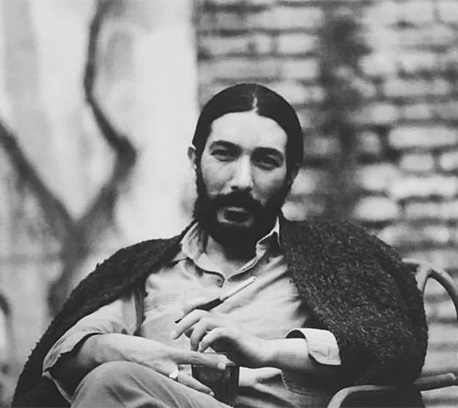
Bijan Elahi (born on July 7, 1945 – died on November 30, 2010, in Tehran) was an Iranian poet, translator, researcher, and painter. He is one of the poets of the movement known as the Other Poetry.
He was born in July 1945 in the Hassan Abad Junction neighborhood in Tehran. He was the only child in a wealthy family whose father was from Shiraz and his mother from Tabriz. He studied the first year of high school at “Alborz High School”.
Elahi started learning languages through self-study and learned different languages such as Greek, Arabic, English, German, and French. Therefore, he translated some great works by Cavafy, Mandelstam, Rimbaud, Michaud, Hölderlin, Joyce, Flaubert, Proust, Eliot, Lorca, Ibn Arabi, etc. from different languages. However, few of his works were published and distributed during his lifetime. In 1969, he married Mrs. Ghazaleh Alizadeh, the author of “The Edrisis House” and “Tehran Nights”; the marriage only lasts for two years. Their daughter “Salmi” later lived with her mother.
With the financial support of Aziza Azodi, Bijan Elahi started and managed a publication office called Nashre 51. He tried to publish and introduce the books of modern poets. He also prepared some books of his own, however, they did not face fortune and didn’t distribute in the market (except for the second edition of The Youth Field). Soon the publication office had to abandon and stop. His sensitivity and obsessive accuracy caused delays to the publication process of his books for years. In the meantime, some books published and distributed in different publications of Amirkabir, Faryab, The Association of Philosophe, etc. The books are as follows: Neruda’s book of poems called “Twenty Romantic Poems and One Song of Despair” (1973), which reached its second edition four years later, “Hallaj Poems” (1975), ” The Youth Field ” by Henri Michaud (1980) and Rambo’s book called “Arthur Rambo’s Illustrated Papers” (1983) is published. In 1988, he met and married Mrs. Jaleh Kazemi, a dubbing artist and TV host. They separated in 2000.
In the years after Jale’s death, Bijan’s insularity intensified. Then he limited his relationship with friends and did not open the door to anyone or accept people. He considered his house “Harun Al-Rashid’s prison” and his silence was louder than before, even in the company of friends.
Finally, Bijan Elahi had a heart attack on the afternoon of November 30, 2010, and died while being transferred to the hospital. According to his, his body moved to the village of Bijd Now (Bijdeh Now) in Marzan Abad city and was buried there.” And according to his will, nothing was engraved on his gravestone except his signature.

